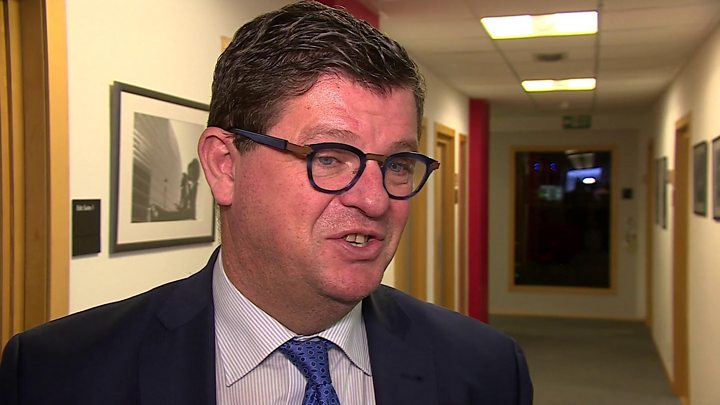‘Impossible’ for Seaborne’s Brexit port to be ready for March

Media playback is unsupported on your device
The mayor of Ostend has told the BBC the Belgian port will not be ready for a new ferry line in time for Brexit.
Bart Tommelein was asked about the UK government’s award of a £13.8m contract to Seaborne Freight for a service between Ramsgate and Ostend.
He said it was “impossible” that Ostend would be ready and that he was going to Ramsgate next week to discuss the situation with “all the stakeholders”.
His remarks came as Transport Secretary Chris Grayling again defended the deal.
Mr Grayling, appearing in the Commons to answer an urgent question tabled by Labour, said no money would be spent unless the service operated correctly.
Mr Grayling said there were “no reasons to believe any of those involved in this business are not fit to do business with government”.
The controversy erupted after the BBC discovered that Seaborne had never run a ferry service before and did not have any ships. Later, it was discovered to have used terms and conditions on its website apparently intended for a takeaway food firm.
Local Conservative councillor Beverly Martin has already said Ramsgate harbour cannot be ready in time for the UK’s scheduled departure from the EU on 29 March.
Video has also emerged of Thanet District Council’s deputy chief executive, Tim Willis, saying it is “rather late” for the government to be spending for Brexit contingency, “just a few short months away”.
Guarantees needed
The Ostend mayor said he had doubts about Seaborne Freight and wanted bank guarantees to ensure that the city would not be left with the bill if the project ran into difficulty.
Asked if Ostend would be ready to run regular services by 29 March, he told the BBC: “No, that’s impossible. We are interested in a ferry line… because we have a harbour and a harbour needs traffic. But there are some inconveniences, also some investments to do in our harbour [and] in the harbour of Ramsgate.
“We need some guarantees [from] the freight line themselves because I’m worried about a few things… I want guarantees about the profitability of this ferry line and the solvency of this company.”
Image copyright
Port of Ostend
Among his concerns were migrants using the port and the costs that Ostend could face for getting ready for the new ferry line. “If the ferry line is getting millions of pounds [from] the government, I think they to do some investments in the harbour,” he said.
Ramsgate has not had a regular ferry service since 2013. The contract to Seaborne was one of three awarded to ease potentially severe congestion at Dover in the case of a no-deal Brexit.
Mr Grayling told MPs that Seaborne would not get any money from the government if the service did not run and the contact award was “done properly in a way that conforms with government rules”.
When asked if the company had told the government which vessel would be used, he relied that the government had been told “in great detail” about the plans.
Shadow Transport Secretary Andy McDonald said Seaborne Freight had “no money, no ships, no track record, no employees, no ports, one telephone line and no working website or sailing schedule”.
‘Unlawful’
One of the firm’s directors, Ben Sharp, is already under investigation by a government department, he said.
“This is a shoddy and tawdry affair, and the secretary of state is making a complete mess of it,” Mr McDonald said.
He added that it “violates every current best practice guidance issued by Whitehall”. It was very likely to be “unlawful”.
Mr Grayling said that £103m of contracts had been awarded to French company Brittany Ferries and Danish shipping firm DFDS, with the smaller contract awarded to Seaborne, a new British company.
The government found “nothing that would prevent them [Seaborne] from contracting with government” after vetting of Seaborne Freight by lawyers Slaughter & May, accountants Deloitte and consultants Mott MacDonald.



